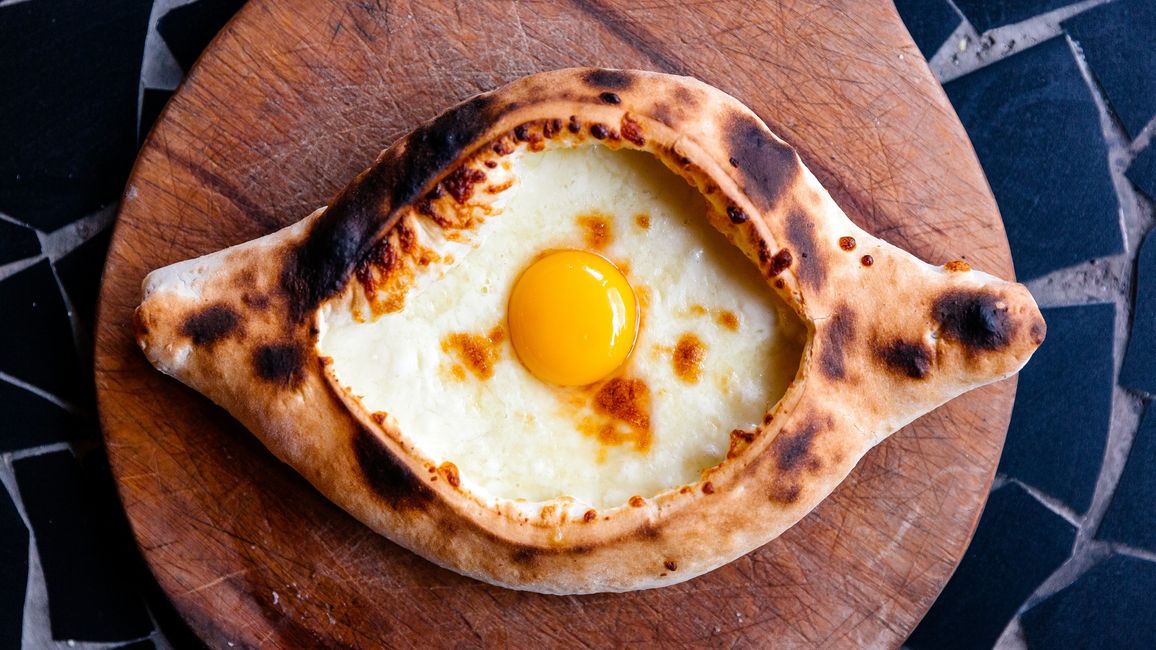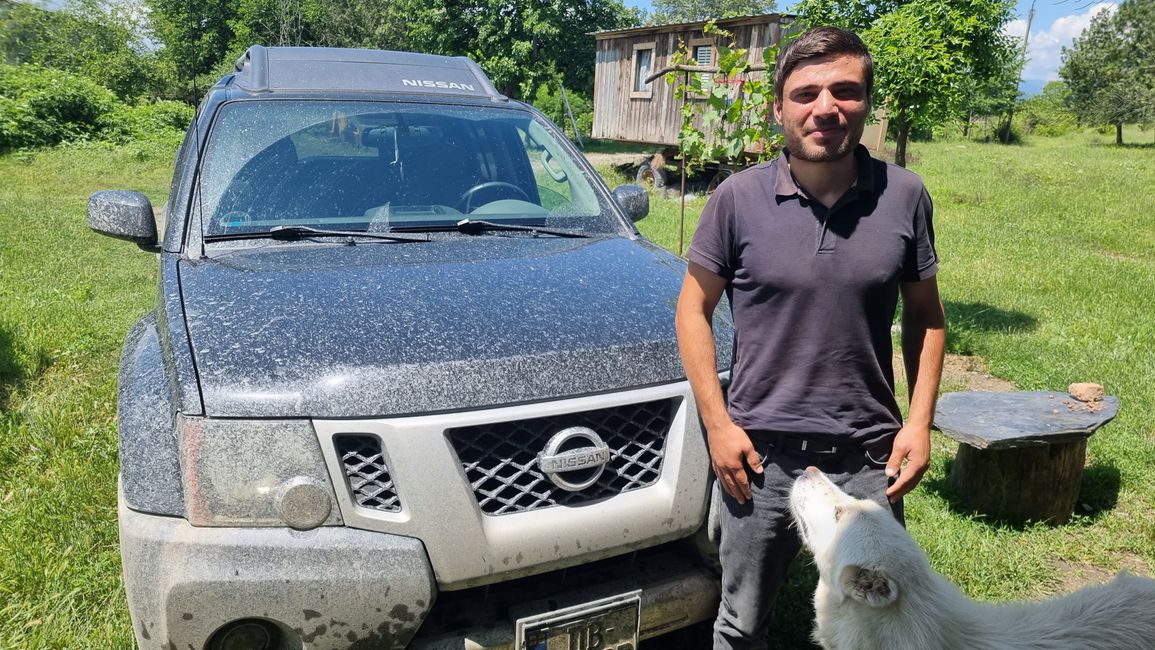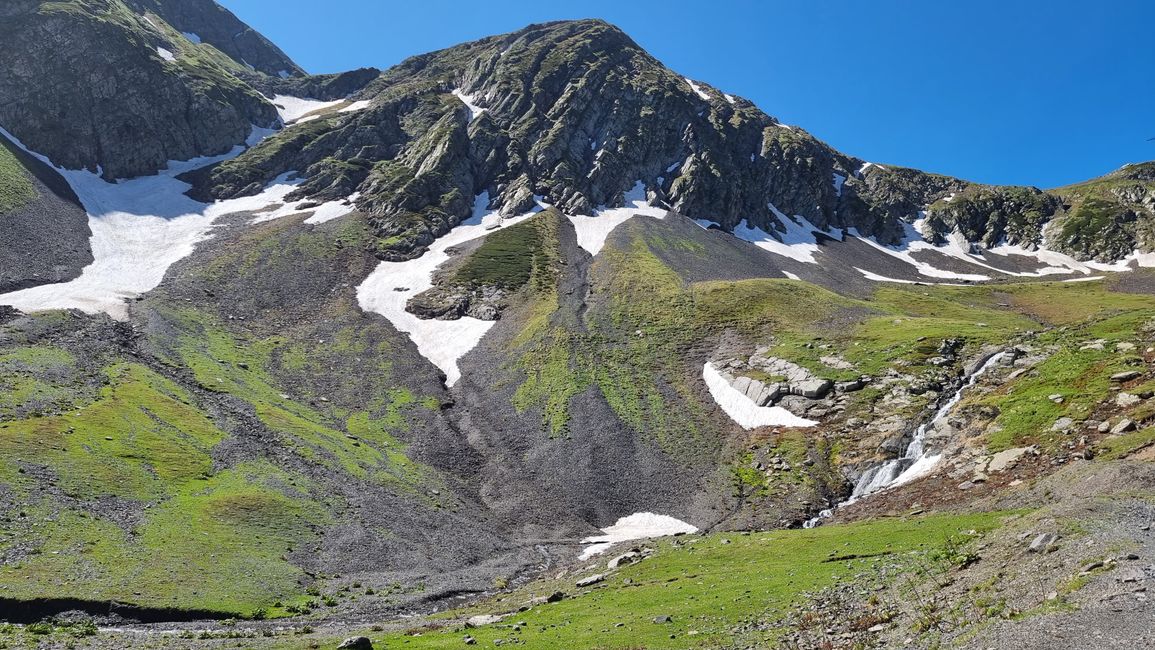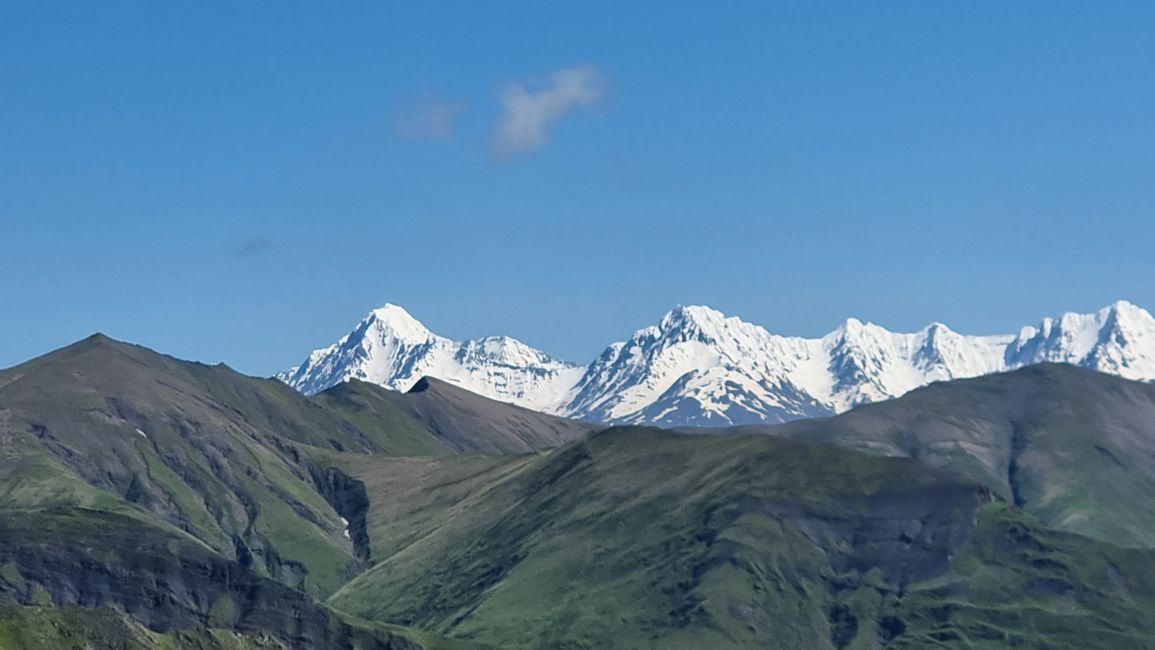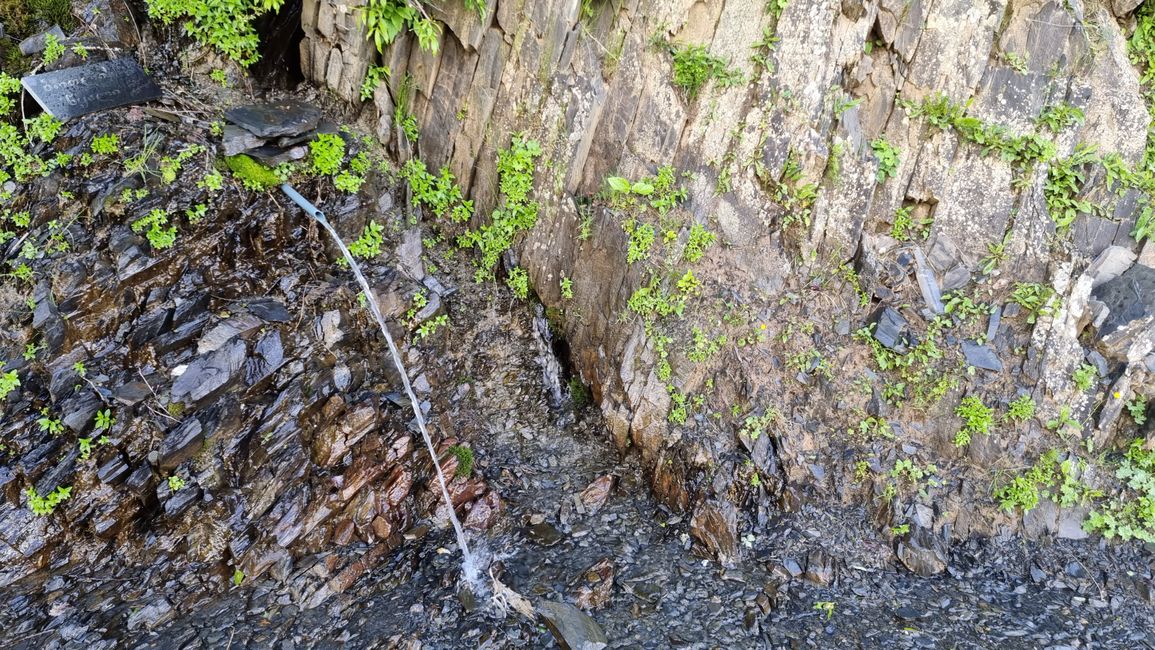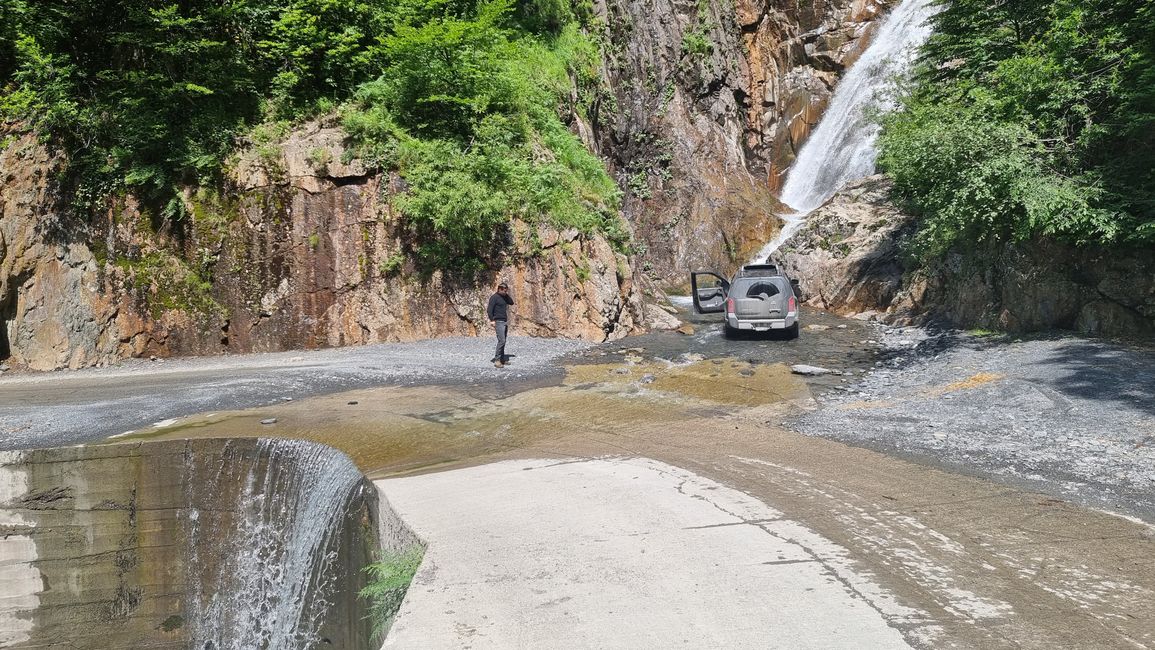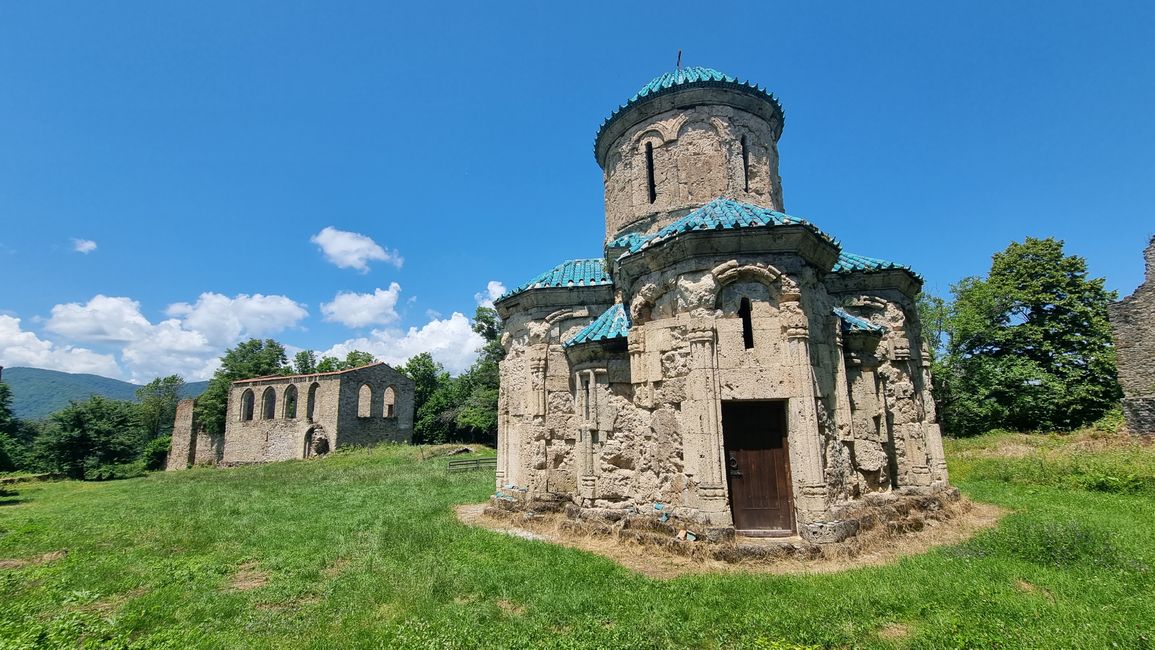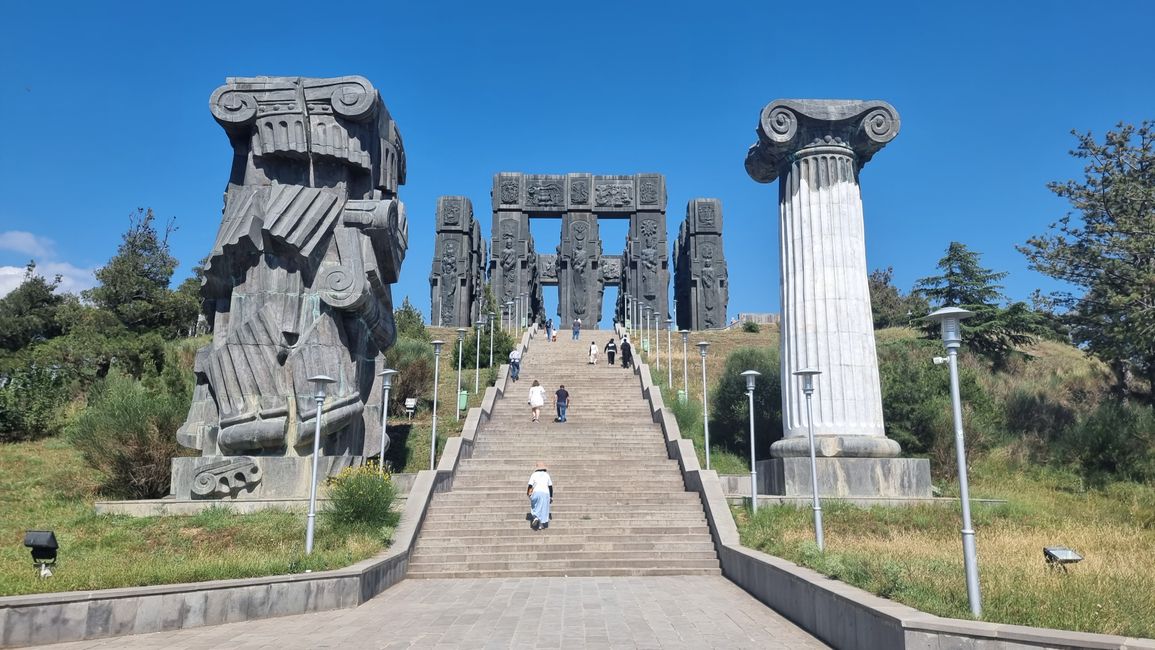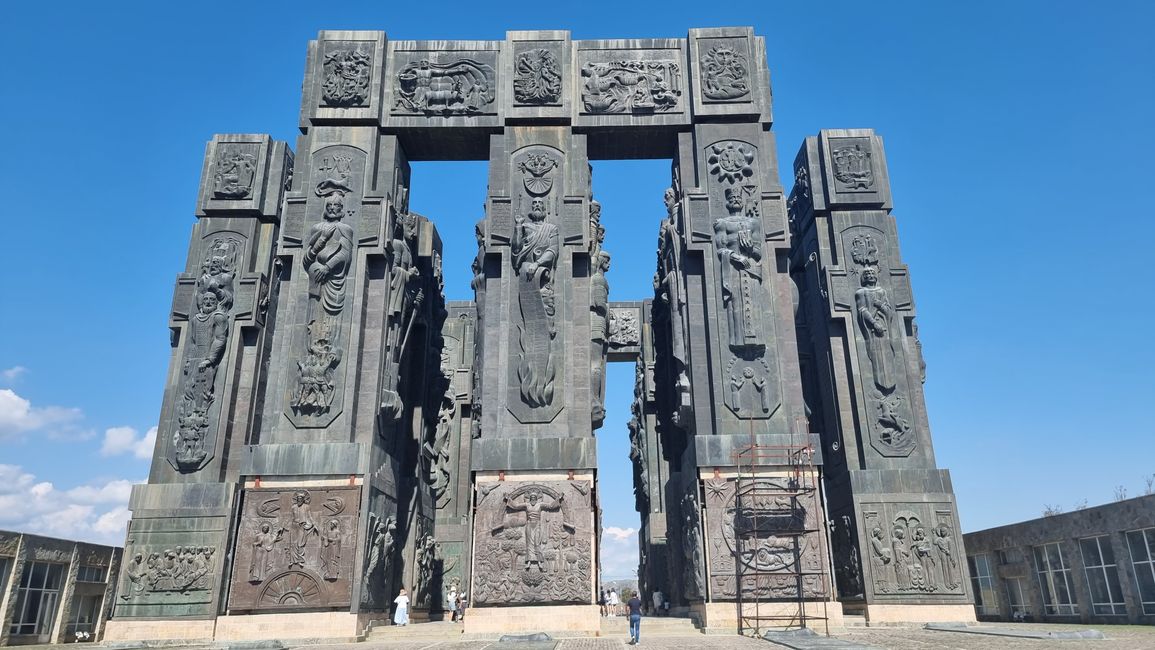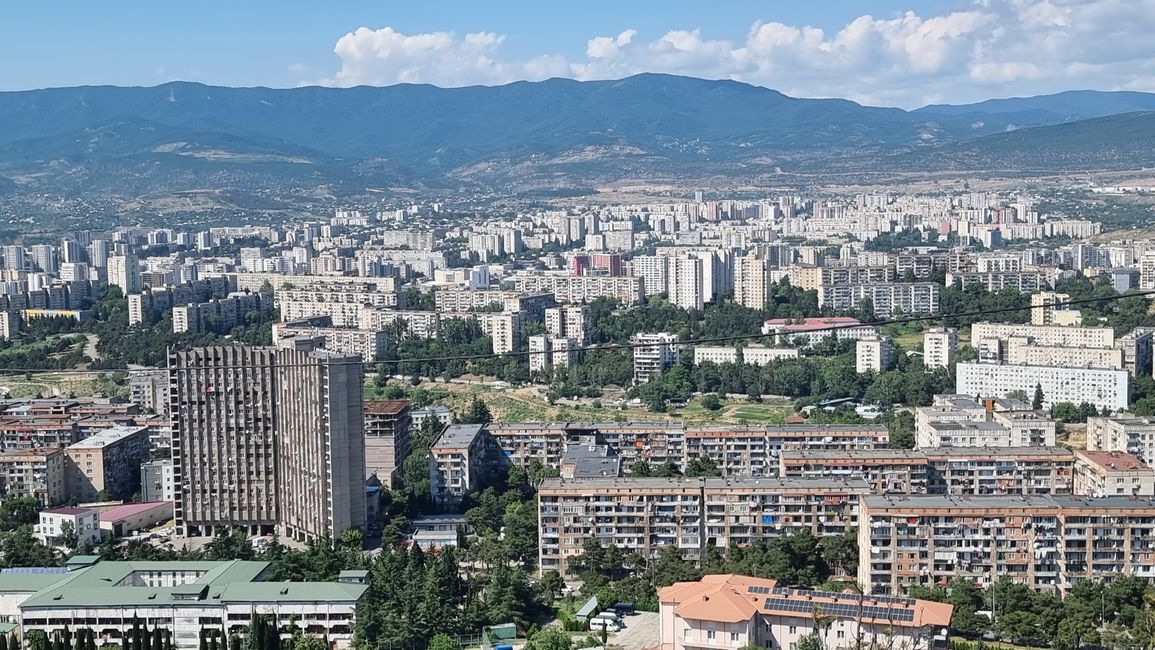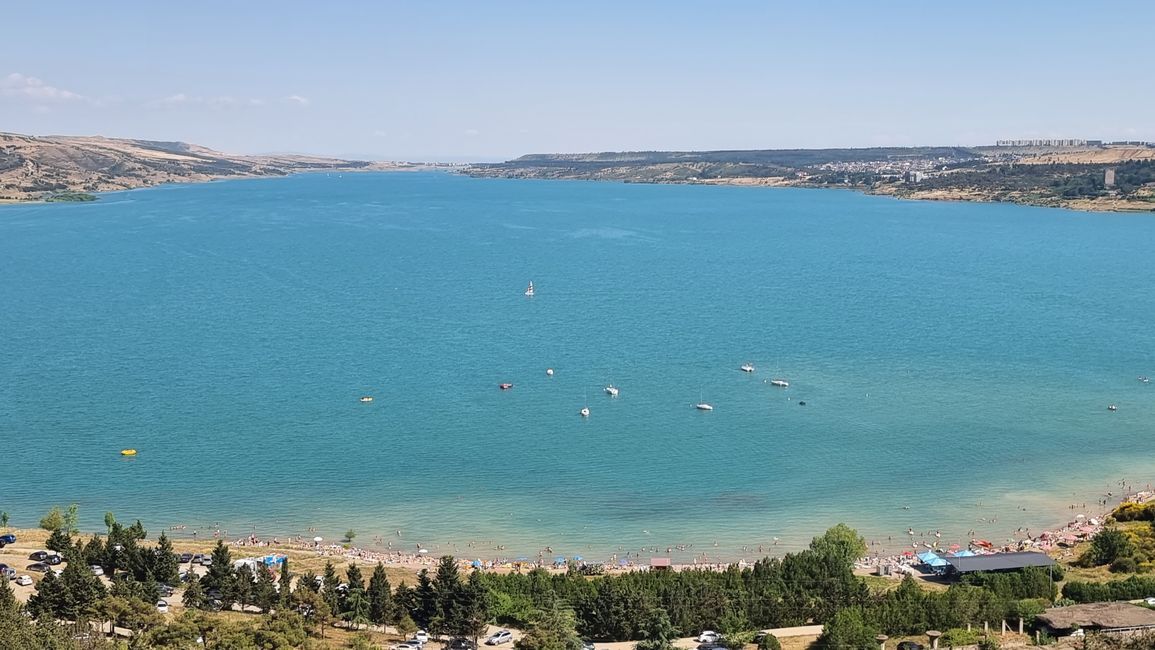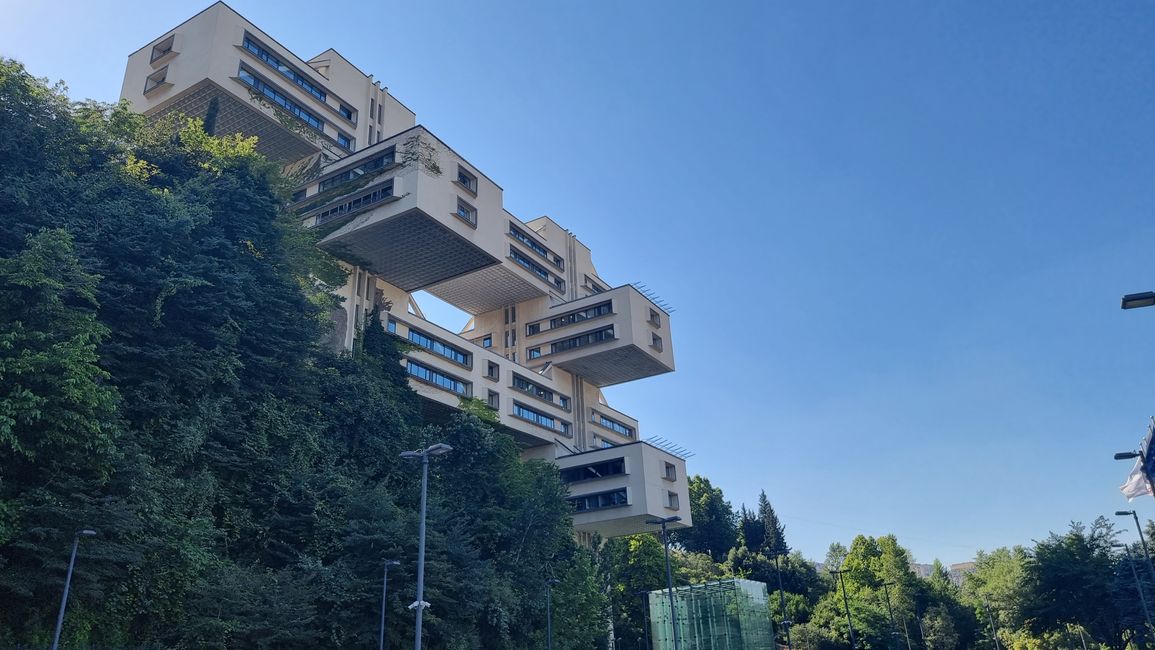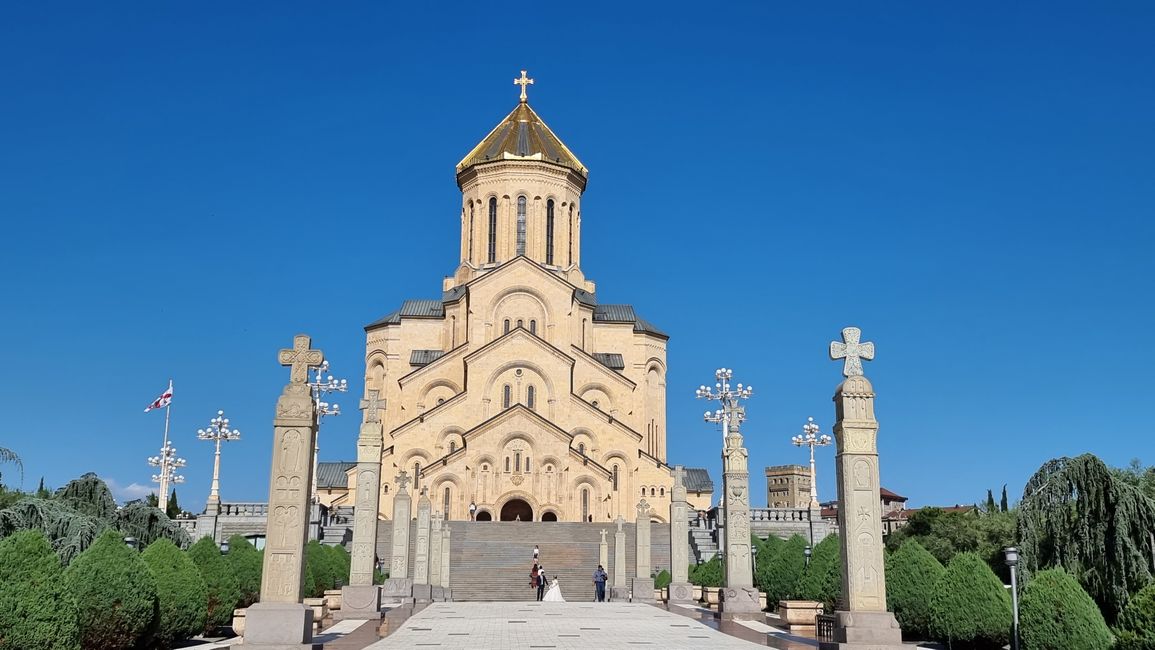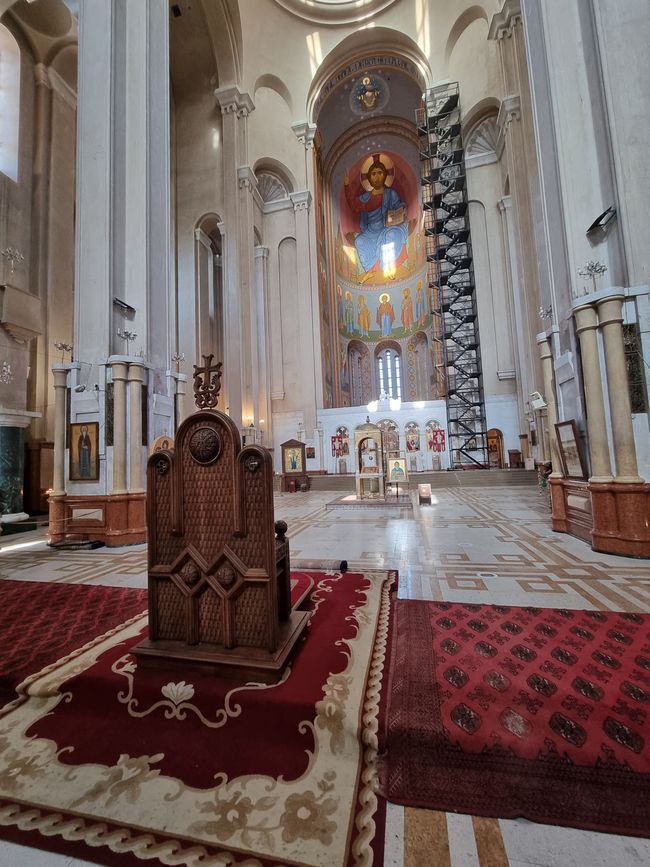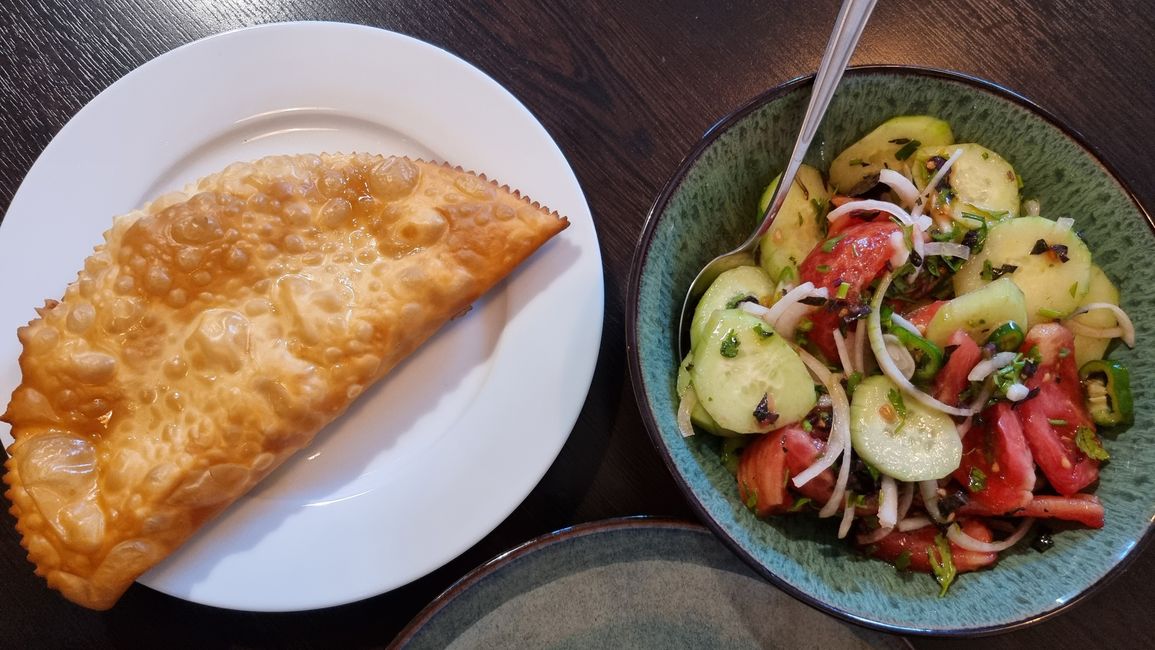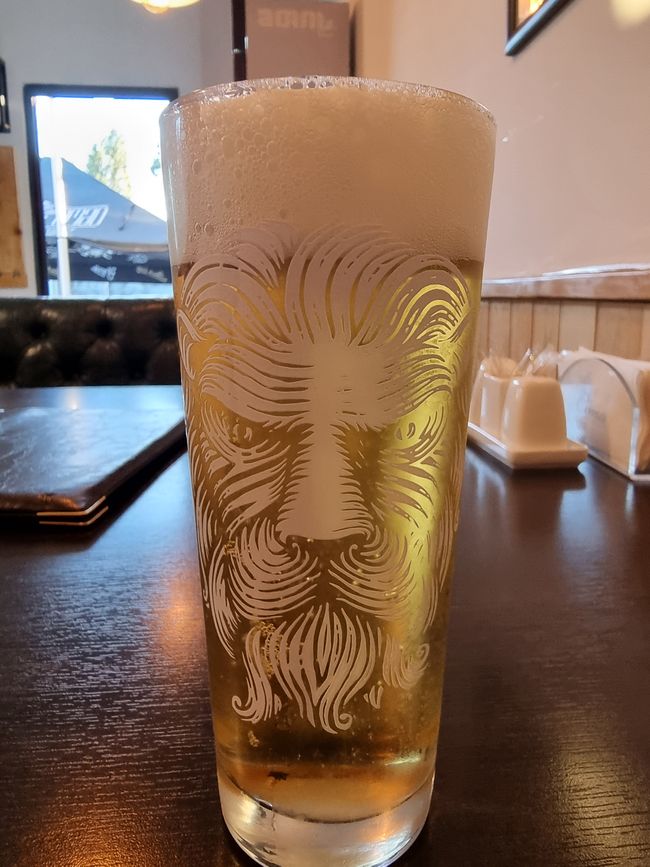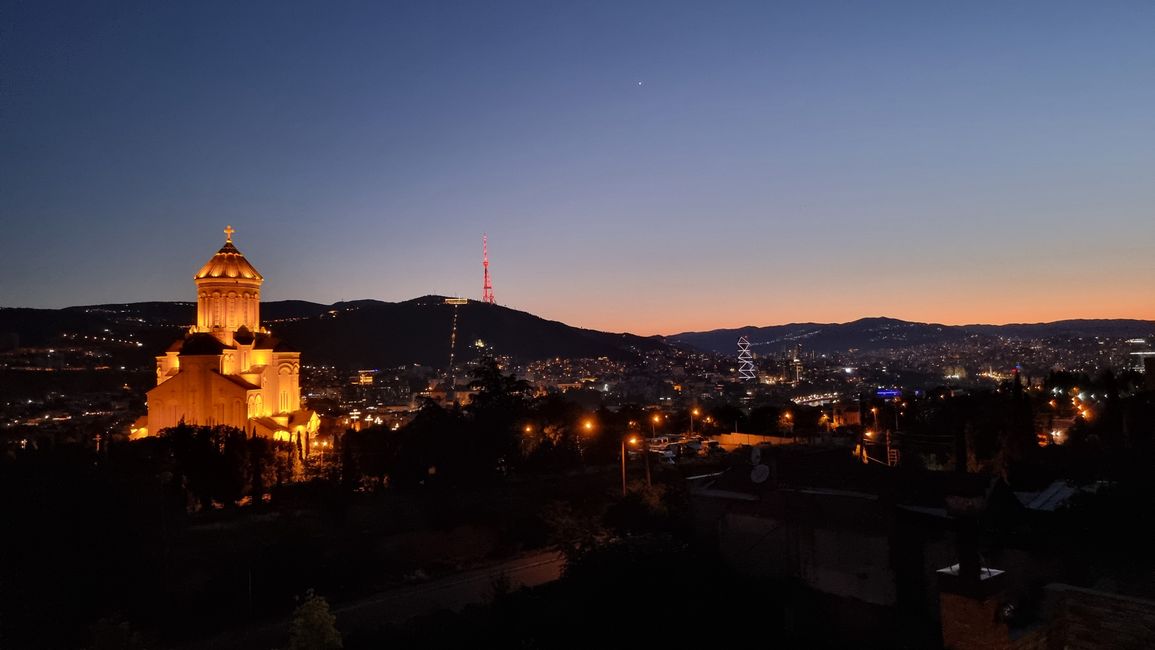Don Curry is walking as a chauffeur
ที่ตีพิมพ์: 27.06.2023
สมัครรับจดหมายข่าว
Don Curry woke up before the alarm clock at 6:30 a.m. The sunlight was already shining through the only tiny window in his turret room. At the same time, the cheerful chirping of the numerous songbirds of Tusheti reached his ears. They were looking forward to the day. Don Curry had mixed feelings...
After packing everything, he took a short walk through the village, scaring the cows grazing on the path in front of him, and met the Spaniard who was already up. They went to breakfast together at 7:00 a.m. Don Curry had asked for a much smaller portion yesterday and got it. The Spaniard was still worried about the shepherd dogs. In the end, they wished each other 'Good luck!'
So Don Curry set out again to conquer the Todespass and drive over the Abano Pass. Today brought one advantage: the sky was clear blue, not a cloud in sight. After leaving Omalos, they soon encountered the muddy road through the outskirts of Tusheti. Yesterday's rain did not improve the situation. Don Curry fought courageously. At the last bridge in Tuschenland, a young man stood on the road and pointed to the following dirt track. Was something wrong? Don Curry wondered, and opened the window. But the man just wanted to ask if Don Curry could give him a ride over the pass to the winter village of the Tuschen. Since Don Curry had no idea when the next vehicle would start the route after him, he took pity on the hitchhiker and asked him to get in. He introduced himself as Nika, a young Tush from the village of Khakhabo, high above the bridge. However, communication was quite difficult because his English skills were limited.
A short time later, they reached a point where the route was completely blocked. A fresh landslide during the night made the road impassable. But an excavator was already working to clear the rubble from the roadway. Don Curry was able to start again about 20 minutes later. After a total of 2 hours, he had completed the route from Alt-Omalo to the Abano Pass. The pass presented itself today in bright sunshine and under a blue sky from a completely different angle. Spectacular views in all directions were possible. For the first time, Don Curry saw a whole chain of snow-covered peaks to the north. He asked Nika if this was already Russia. 'Yes,' he confirmed, 'that is Dagestan.' Suddenly, an idea came to Don Curry. A Tush must cross the Abano Pass several times a year and probably knows every curve. So he asked Nika if he would be willing to drive the rest of the way. He immediately reacted enthusiastically and happily took the wheel. Don Curry quickly realized that Nika not only knew every curve, but also every pothole and rock bump on the road. He skillfully used an excellent combination of foot brake, hand brake, and engine brake. Don Curry would have done the same on the long downhill stretch, but much more cautiously. Nika zoomed down the track at 20-30 km/h, twice as fast as Don Curry's Abano speed. However, he still felt safe with his driver, although he feared that at some point he had pushed through the footwell on the passenger side because he was instinctively constantly trying to brake.
Although communication was still difficult, both had a lot of fun on the journey. After Don Curry asked twice for a short stop to take pictures, Nika began to stop at places he considered particularly beautiful. He showed Don Curry a spring from which ice-cold mountain water constantly bubbled; Don Curry promptly filled an empty wine bottle with the refreshing water. There was also a memorial plaque for four men who had crashed together in their car into the abyss a few years ago. 'Too much Chacha,' said Nika. Of course, he also knew the 'car wash' waterfall and allowed Don Curry to shoot an insider video there. At a later waterfall, he drove with Xerra into the river bed right up to the falling water, so that the vehicle was completely in the water, but Xerra didn't mind with her high wheels.
Then there was asphalt under Xerra's tires again, and Nika picked up speed again. As a typical Georgian driver, speed meant more to him than safety. He zoomed through the villages at a good 90 kilometers per hour until Don Curry admonished him to be a bit more moderate. In a small shop, he bought 2 cans of Coke for Don Curry and himself to toast with. Then, while driving calmly, he held the open can of cola in his left hand and touched the steering wheel a little with his right hand, while starting a video call with his sister to announce his upcoming arrival. The sister had to wave to Don Curry in between, and he waved back friendly. Finally, the two reached Nika's home, which is located at the very edge of the winter village of the Tuschen and is probably a converted cattle barn. Don Curry actually wanted to continue right away, but Nika asked him to come in for a few minutes until he finally agreed. Here, he got to meet Nika's sister Buna and also their mother in person. A quick lunch was organized. As soon as Don Curry took a seat, fresh herbs, cheese, bread, butter, and two different types of large fish were already on the table, one cooked, the other smoked. They were served with red Tkemali sauce, and Nika's mother was pleased that Don Curry knew Tkemali. When two bottles of beer, two bottles of wine, and a bottle of Chacha were brought, Don Curry finally urged them to leave. Nevertheless, he had to drink half a glass of wine; and Nika noted down his phone number. If Don Curry had any problem in Georgia, he should call immediately.
Don Curry and his unexpected chauffeur said a heartfelt goodbye. And somehow, Don Curry felt a little strange being alone with Xerra again. But he still had a lot to do today. He had to move on...
The first destination was not that far away. Once again, Don Curry wanted to visit a medieval monastery, and once again, this monastery was hidden high up in a forest. The new road to the monastery had just been completed, but not yet opened. A big excavator stood in the middle of the newly paved section, making it impossible for any car to pass by. So Don Curry had the choice to continue driving without accomplishing anything or to hike up to the monastery on foot. 20 minutes later, he arrived at the top sweating. On the way, he encountered a small dog that barked cautiously at him, but when Don Curry continued to approach, the four-legged creature fled whimpering into the forest. Don Curry had never scared dogs like that before and attributed this peculiar behavior to the Panama hat he was wearing today to protect himself from the burning sun. The little dog probably couldn't handle so much elegance.
The monastery was indeed very idyllic with a wide view of the surrounding forests. Impressive remains of mighty walls testified that Kwetera used to be a fortified monastery, certainly also for the protection of the surrounding population.
Two hours later, Don Curry returned to Tbilisi. The capital of Georgia is so central and a real traffic hub that you have to pass through it from time to time. Don Curry even saved three sights that are all located outside the old town, and that he could only reach with difficulty in the first days of his trip without a car. He could already see the first destination from a distance. An Georgian artist created a massive artwork on a hill on the outskirts of the city: the Chronicle of Georgia; sometimes it is also referred to as the 'Stonehenge of Tbilisi'. He carved scenes from the life of Jesus into the massive black stone pillars at the bottom and huge statues of important personalities from Georgian history above. A chapel and a fantastic view of Tbilisi's high-rise landscape complete this excursion destination, which is very popular on Sunday afternoons. At the foot of the hill, the Tbilisi Lake spreads out, also known as the 'Sea of Tbilisi', with all aspects of cultivated beach life: from sun lounger rental on the sandy beach to fish restaurants, speedboats, and even small yachts anchored here.
But Don Curry wasn't going to the beach, but to the Ministry of Road Construction of Georgia, even though it's closed on Sundays, of course. This ministry is located in one of the most unusual examples of brutalism, an architectural style that was often used in socialist countries. The ministry looks like a structure loosely stacked from uniform, elongated building blocks. Don Curry imagines that it will be quite difficult to find your way around the building because only a few 'building blocks' are connected to each other at any given time. But that is certainly not his problem.
Finally, he drove to the Sameba Cathedral, the largest Georgian church in the world, inaugurated in 2004. In appearance, it is similar to most other Georgian churches, but everything is much larger. It wants to impress - and you can feel it. Its interior resembles more of an exhibition space for large precious icons than a worship space. Nevertheless, there was probably a church service going on, as Don Curry thought he noticed movements behind the iconostasis, and a small male choir from the gallery sang impressive liturgical chants. At least this filled the huge cathedral with a spiritual atmosphere.
Only a short distance remained from this church to Don Curry's pre-booked Hotel Siberia. It is located in a typical residential area that has no tourist significance. As often, Don Curry chose this accommodation because it promised a spectacular view. From his balcony, he could not only admire the cathedral he had just visited in all its splendor, but also the entire skyline of Tbilisi. In the distance, he could even spot his very first hotel in Georgia, right next to the lower Bethlehem Church.
The restaurant scene in this part of Tbilisi can be described without exaggeration as modest. But thanks to Google Maps, Don Curry found a restaurant within walking distance: Vakhtanguri's Chebureki. On the way there, he took part in the Sunday evening life of Georgian families. Much of it took place outside: children playing, neighbors chatting. Don Curry almost felt like he was walking through several living rooms. But the restaurant wasn't far away. Honestly, judging by its appearance, Don Curry probably wouldn't have entered it, probably wouldn't even have recognized it as a restaurant. Apart from a Georgian sign on the facade, nothing indicated it. Nevertheless, it turned out to be well attended, probably exclusively by guests from the neighborhood. They all knew each other. As the name suggests, the restaurant specializes in Chebureki, originally a dish of the Crimean Tatars that has spread throughout the entire influence area of the former Soviet Union. Chebureki are fried pastries filled with various ingredients. Faced with the very low price (€1.80), Don Curry asked how many he needed to order to get full. One Chebureki is one portion, the waiter said. So Don Curry ordered a Chebureki with minced meat filling, a serving of Tkemali, and a tomato-cucumber salad, this time without walnut dressing. For a drink, he chose a glass of white wine, which should be available by the glass. The waiter explained that today they only had bottles, no glasses. So Don Curry changed his plan and ordered a 'Black Lion' beer on tap, which was actually served by the glass. It turned out to be one of the most delicious and at the same time cheapest meals in Georgia; Don Curry not only ordered another beer, but also another Chebureki. After the greasy pastry, Chacha had to provide urgent support in the digestion. Just to be on the safe side, Don Curry asked if it was available by the glass today or only as a bottle. The waiter grinned.
What a wonderful day it had turned out to be once again. Don Curry came up with an extremely elegant solution to a burdensome problem. And at the same time, he learned that a good deed sometimes pays off immediately. Nika had found a free transportation to his home and Don Curry had a free competent chauffeur through the dangers of the Abano Pass. And now he had a friend in the Tush people...
'There's another Chacha on the house,' said the waiter. And later, Don Curry sat on his balcony, admired the brightly lit cathedral and the rest of Tbilisi, and enjoyed his life.
สมัครรับจดหมายข่าว
คำตอบ
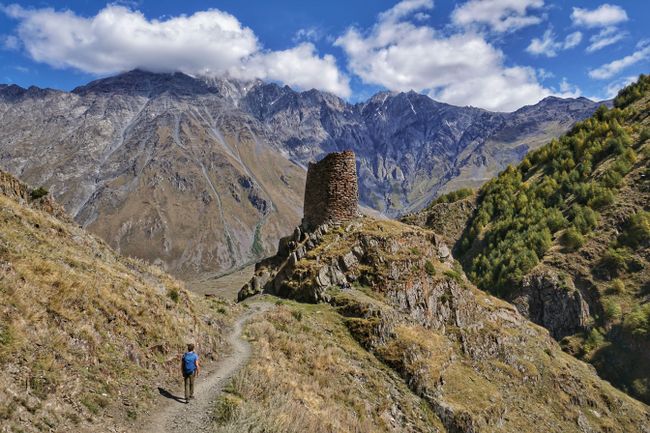
รายงานการเดินทาง จอร์เจีย

